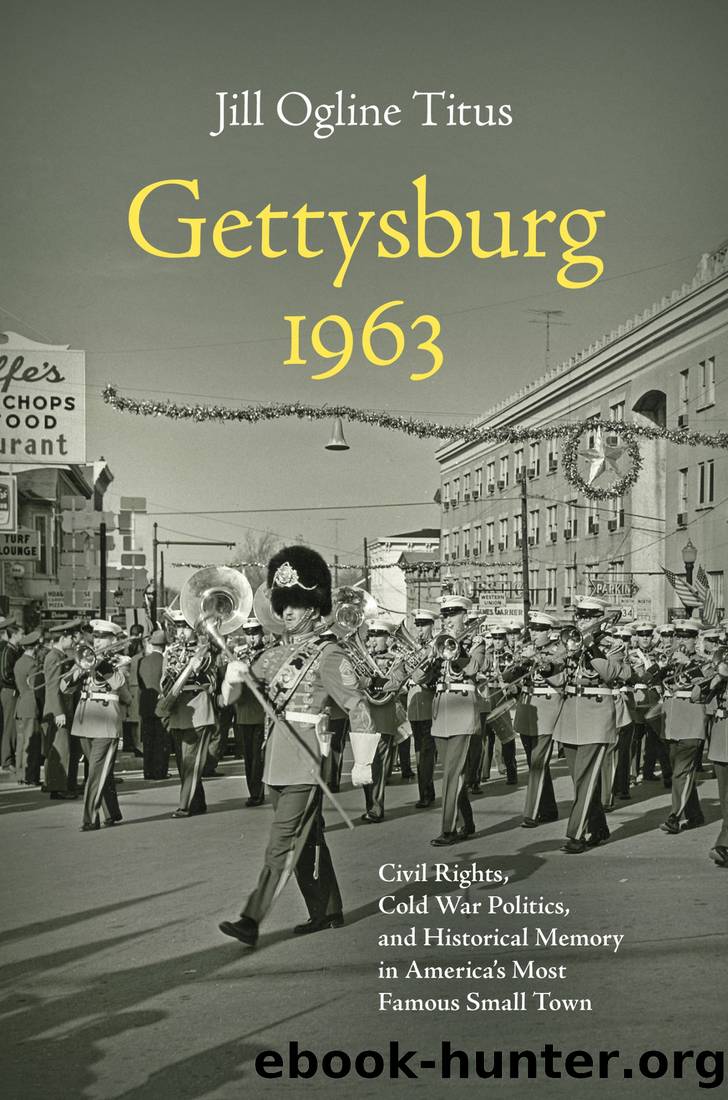Gettysburg 1963: Civil Rights, Cold War Politics, and Historical Memory in America's Most Famous Small Town by Jill Ogline Titus

Author:Jill Ogline Titus [Titus, Jill Ogline]
Language: eng
Format: epub
ISBN: 9781469665337
Google: 6ZRgzgEACAAJ
Publisher: University of North Carolina Press
Published: 2021-09-15T20:33:12+00:00
CHAPTER SIX
The Pen Is Mightier than the Sword
Lincolnâs Gettysburg Address
Though men such as Conrad Wirth and Kittridge Wing drew a sigh of relief as July 5 dawned, the Gettysburg centennial was far from over. The battle had been commemorated, but the anniversary of Lincolnâs speech loomed large. In the early days of the centennial, the Gettysburg Address anniversary was little more than an afterthought in most plannersâ minds; arrangements for November took a back seat to preparations for the July events and the bulk of the available funds were expended on the battle anniversary, leaving little left over to draw on to commemorate the address. In retrospect, however, some members of the GCC argued that the November events were the pinnacle of the anniversary year. In a letter to William Scranton, General Edward J. Stackpole insisted that âthe commemoration of the Centennial of Lincolnâs Memorial Address was of even greater significance than the battle itself.â Observing the anniversary of Lincolnâs speech required a different kind of approach than the one taken in July, characterized more by lectures, round tables, and policy discussions than costumed impersonation. Clearly anticipating a more cerebral vibe for the November activities, the Washington Post predicted that âGettysburg residents can begin shaving off their beards and taking off their crinolines,â and turn their attention instead to commemorating ideas.1
Gettysburgâs prime position in the national imaginationâfrom 1863 onwardâhas derived in large part from Abraham Lincolnâs iconic refashioning of the battle narrative into a vision for the nationâs future. Though initially derided by some, Lincolnâs âfew appropriate remarksâ at the November 19, 1863, dedication of Soldiersâ National Cemetery quickly shed their original context as a rallying call for a weary North to press on with the war effort and assumed the status of sacred American scripture. The Gettysburg Address took on an increasingly global prominence during World War II, as the U.S. government began to broadcast it abroad as an exemplar of American political ideas and a universal rallying cry for democracy.2 By the 1960s, Lincolnâs speech had assumed nearly unparalleled stature as an encapsulation of the virtues supposedly cherished by the âfree worldâ and inaccessible beyond the Iron Curtain.
Perhaps buttressed by critiques of the battle anniversary as commercialized and cartoonish, this political context ensured that the November commemorative activities would be less populist and more global in focus. They were also, at least on the official level, more diverse, with esteemed African Americans playing formal roles in the program. In their own distinct ways, Marian Anderson, Judge Raymond Pace Alexander, and E. Washington Rhodes clearly articulated the argument that the ongoing Black freedom struggle was the direct outgrowth of the unfinished work of which Lincoln had spoken.3 Due in large part to their participation and an accompanying heightened focus on international context and global opinion, the tenor of the November commemoration was more substantive than the battle anniversary and more officially aligned with the emancipationist interpretation of the war. While the vision of civil rights reform espoused was fairly
Download
This site does not store any files on its server. We only index and link to content provided by other sites. Please contact the content providers to delete copyright contents if any and email us, we'll remove relevant links or contents immediately.
In Cold Blood by Truman Capote(3366)
The Innovators: How a Group of Hackers, Geniuses, and Geeks Created the Digital Revolution by Walter Isaacson(3111)
Steve Jobs by Walter Isaacson(2879)
All the President's Men by Carl Bernstein & Bob Woodward(2357)
Lonely Planet New York City by Lonely Planet(2204)
And the Band Played On by Randy Shilts(2180)
The Room Where It Happened by John Bolton;(2141)
The Poisoner's Handbook by Deborah Blum(2123)
The Innovators by Walter Isaacson(2088)
The Murder of Marilyn Monroe by Jay Margolis(2085)
Lincoln by David Herbert Donald(1977)
A Colony in a Nation by Chris Hayes(1913)
Being George Washington by Beck Glenn(1872)
Under the Banner of Heaven: A Story of Violent Faith by Jon Krakauer(1785)
Amelia Earhart by Doris L. Rich(1680)
The Unsettlers by Mark Sundeen(1675)
Dirt by Bill Buford(1661)
Birdmen by Lawrence Goldstone(1652)
Zeitoun by Dave Eggers(1631)
